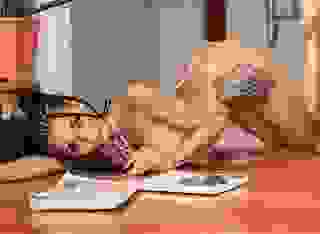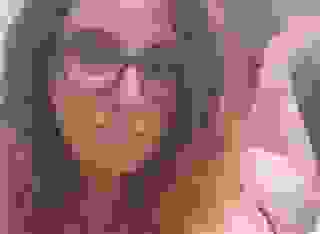Note: You can change font size, font face, and turn on dark mode by clicking the "A" icon tab in the Story Info Box.
You can temporarily switch back to a Classic Literotica® experience during our ongoing public Beta testing. Please consider leaving feedback on issues you experience or suggest improvements.
Click here**
Patricia Cowden bought a soda and headed to her favorite spot in the second-floor teachers' lounge. She set her drink on a table next to a large, comfortable sofa and settled into the couch, tucking her feet under her. She took a sip from the can and began. The story so engaged her that she didn't notice when Maribel Garcia walked into the nearly empty room. The English teacher saw her friend's intent face and decided against greeting her and breaking her concentration. She instead sat at a table and graded grammar quizzes.
Twenty minutes later, Pat sighed, placed the papers on the cushion beside her and reached for her drink. She saw Maribel then and stood, grabbing the story as she rose.
"Hi," she said, joining the teacher at the table. "Do you have a few minutes?"
"Depends. Will I enjoy whatever it is you want me to do with those few minutes?"
"I expect so." Pat smiled and extended the sheaf of papers to her colleague. "I'd like you to read this. It's a story Luke Tang wrote. I'd like your opinion of it."
Maribel tidied the stack of test papers and lay Luke's story before her. She bent her sleek, dark head forward slightly to read, keeping her back straight and shoulders down. Even deep in thought, Maribel remained conscious of her posture. She read rapidly, as English teachers tend to, but with thorough concentration. Toward the end, her pace slowed a bit, and she read the last page twice. She sighed deeply and looked up at Pat.
"Wow."
"I agree."
"This is terrific. It's written well, it's touching, it reads as if it's well researched. When did he write this?"
"Apparently over the weekend. He read ahead in the history text and came up with the idea. Or so he told me."
"Or so he told you?" Maribel lifted her eyebrows, inviting Pat to say more.
"Yes." Pat frowned. "His mother called me this morning, saying he had written this story and told her that I had assigned it. She wanted to know if I really had assigned it. I covered for him and said yes. I'm not sure why. Something didn't feel right."
"Why would he lie about it?"
"He told me she doesn't like him to write stories that aren't for school."
"Why ever not?"
Pat shrugged.
"Who knows? I have no idea. But he's meeting me after school today and I intend to find out then. I mean, I could see disapproving of a child who spends his spare time getting into trouble, but why forbid a child to write? Especially when he can write like this? It doesn't make any sense."
Maribel glanced at her watch. "Let me know what he tells you. He's one of the best students I've had in a long time, and a really sweet kid, too." She handed the story back to her friend. "You know, I think this could be contest material. Isn't the Pennsylvania Heritage contest coming up?"
Pat looked at the ceiling, thinking. "I believe so. I've never entered any of my students' work in it, though."
"Maybe you should."
The bell rang. Maribel tidied her papers and returned them to her briefcase. "See you tomorrow. I've bus duty today."
Pat grinned. "Your favorite!"
Maribel rolled her eyes and disappeared through the doorway.
**
Luke and Mrs. Cowden reached her classroom at the same time. She gave him a warm smile as she unlocked the door.
"Come on in," she said, motioning him to precede her into the room. "How's the rest of your day been?"
Luke thought about the finger he had jammed trying to play basketball. It still throbbed. But he saw no need to lessen his favorite teacher's opinion of him.
"Fine," he lied.
"Good," she replied, setting her bag on her desk. Where Mrs. Garcia carried a tidy, orderly briefcase, Mrs. Cowden schlepped a vast canvas bag crammed with papers, folders, pens, and sometimes as many as three uneaten lunches.
"I had a chance to look at your story this afternoon, Luke, and I want to tell you, I think it's excellent. Really first-rate."
She smiled at him as she pulled out the story. Luke blushed to the tips of his ears.
"Thanks. It was great of you to read it. Was there, um, anything you really liked?"
Mrs. Cowden's eyes gazed at the ceiling as she considered.
"Well," she said, "To start with the general, the plotting and pacing are both nicely done. Your writing has a good flow to it -- easy to read. Your main character, Wang Bian, is strong and well developed. You include enough detail to place the reader in the scene, but not so much that it gets distracting. It's a shame you kill him off at the end -- he's such a nice guy, and it's natural for the reader to want him to succeed."
"But did you see why I did it that way?" Luke broke in. "I hated for him to die, too, but he had to."
"Oh, I see your point. It's just too bad. We Americans are conditioned to want happy endings."
"Doesn't everyone?" Luke asked, diverted.
"No," Mrs. Cowden said. "People in other countries regard the American penchant for happy endings as simplistic and childish. Remember, Shakespeare killed off Romeo and Juliet, and that ending makes it a great play. But if he were writing now and offered that script to Hollywood, I bet they'd make him change it."
"Do you think he would?"
"I should hope not, but I don't know," Mrs. Cowden smiled. "Shakespeare had a great feeling for what people liked, and, you know, even playwrights have to eat."
The remark sounded so like his mother's line that writing would never put food on the table that Luke's smile faded.
"What's wrong?"
"Oh, I just thought of something, that's all," he said. "Nothing important."
Mrs. Cowden gave him a sharp look. After her conversation with Mrs. Tang this morning, she had a fairly good idea where the boy's thoughts lay.
"Luke, why don't you tell me what's going on with you?"
His eyes widened as he met her gaze. "Uh ... what do you mean?"
"You know what I mean, Luke. You. Your writing. Your mother. What's up?"
"Nothing. There's no problem."
She could almost hear the conflict in the boy's mind. He wanted to unburden to someone, but he didn't want to face whatever the problem was. And telling someone would make that problem all the more real.
"Baloney. I don't get strange phone calls from angry mothers trying to see if their sons are lying to them when there's, quote unquote, no problem."
"I already told you. She doesn't like me to write stories if they're not for school."
"There's more to it than that, Luke. Quit playing games with me."
He sighed.
"My parents want me to be brilliant in math and science so I can be a doctor or go into business. They think if I would quit writing, I would turn into a math whiz."
Mrs. Cowden stared at the boy. That idea made absolutely no sense.
"Have they ever told you that?"
"They say so all the time. 'Quit writing silly stories and study your math. You'll never get anywhere if you keep wasting your time with stories. That's not how you get ahead. You get ahead by being a doctor or a banker or a businessman, not a writer.' "
"Tell that to Stephen King."
"That's exactly what Mrs. Shuman said," Luke said, his eyes wide.
"Evelyn Shuman's one smart cookie," Mrs. Cowden said. "Is she your teacher?"
Luke's gaze dropped the floor.
"Not anymore. I had her for pre-cal for the first week, but then she switched me to advanced algebra. She said I didn't have the background for pre-cal."
"What did your parents say?"
Luke hunched into his shoulders, remembering how his mother had screamed.
"They weren't happy. They said I was," and he paused to sigh, "stupid and lazy, and didn't work hard enough."
"Do you think that's true?" she asked gently.
"Sometimes."
"Why?"
"Well ... I know I could probably spend some of the time I spend reading on math. But I also know the amount of time I spend on it doesn't seem to help. I've never been very good at it, whereas English and languages and things like that, are easy."
"Hmm. Have you ever tried a tutor?"
Luke snorted.
"A tutor? My parents would never do that. They'd say it was a waste of money."
"What about a peer tutor? Another student who has already completed the course successfully and can spend some good one-on-one time with you?"
"I didn't know there were people who did that. How do I find one?"
"Ask your teacher. Who is your math teacher now, anyway?"
"Coach Spencer."
"Hmm. I know he's busy with the season right now," she said tactfully. "You might also try Mrs. Shuman. She can probably find someone for you."
"All right," he said, his tone doubtful.
"Just try it," she said.
"Okay," he said, his voice a little firmer.
"Now, back to your story."
His face brightened.
"I hope you don't mind, but I also showed it to Mrs. Garcia."
"Mrs. Garcia? Why?"
"Because I hear she's pretty good at this writing thing."
Luke smiled.
"Anyway, she agreed it's excellent. She suggested you enter it in the Pennsylvania Heritage writing contest."
He frowned. "But it's not about Pennsylvania."
"Not a problem. The contest has four divisions: fiction and non-fiction about the great Keystone State, and general historical non-fiction and fiction. I propose that you enter it in general fiction."
"Great! What do I have to do?"
"Well, you need to make a good, clean copy, fill out an application, and oh, yes, there's an entry fee. Let me see how much it is." She leafed through some papers in a desk drawer, pulling one out. "Fifty dollars."
Luke sat back in his chair.
"I don't have fifty dollars. I wash dishes, and you don't get many tips doing that."
"Could you get it from your parents?"
"Are you kidding? They'd never give it to me."
She reflected on this.
"Suppose I called and asked. Do you think they might then?"
"No, but you could try. They'd do it for you sooner than they'd do it for me."
"Now, Luke, surely it's not that bad."
He bowed his head. She didn't hear him whisper, "It's worse."
A few minutes later, after Luke had left, Mrs. Cowden called the phone number her student had written down for her.
"Lucky Garden," a woman's voice said.
"Hello, I'm trying to reach Mrs. Tang, please."
"This is she. Who is this?"
"This is Pat Cowden. From White Rose High School. We spoke this morning."
"Ye-es?"
"Mrs. Tang, I've read your son's story and I think it's excellent."
"Oh."
Mrs. Cowden ignored the negative inflection in the other woman's voice.
"So excellent, in fact, that I'd like to use it as White Rose High School's entry in this year's Pennsylvania Heritage writing contest. It's a prestigious contest -- it carries a big prize and the winning entry is reprinted in a state magazine."
"And?"
Mrs. Cowden didn't like the edge in the woman's tone.
"There's an entry fee. That's why I'm calling. The fee is fifty dollars."
"I'm afraid we can't afford that, Mrs. Cowden," Mrs. Tang said. "We're just starting our business again here in Pennsylvania. We don't have extra money to waste."
"It's not a waste. I think your son has a good chance of winning, Mrs. Tang."
"Well," Mrs. Tang said, "I don't. Now, if you'll excuse me, I have customers."
Mrs. Cowden heard the click and replaced her receiver in its cradle. She stared at the phone for a couple of minutes.
"Damn it!" she swore. "If she won't pay it, I will!"
**
At Melina's request, Pete dutifully rescued his bicycle from the spiders in his garage, pumped up the tires and dusted off the frame. After a quick lunch, the two set off together.
They rode their bikes to a park October had turned into a glorious carnival of color. Melina took the lead most of the time. Whether she realized that this allowed Pete an excellent view of her undulating backside, Pete did not know. He simply enjoyed the scenery.
Both strained to climb the final hill to the park. Stopping near a large gazebo, they leaned their bikes against a tree. Pete dropped to the ground, his chest heaving, sweat running down his flushed face.
"Dear God in heaven," he panted. "Are you trying to kill me? My heart's about to explode."
Melina sat down beside him, breathing heavily. She opened her backpack and brought out two bottles of water. She handed him one and drank deeply from the other.
"Not unless I'm trying to kill myself too," she said after a few gulps. "That was one heck of a climb. I thought Maryland was hilly, but this place makes Maryland look like Kansas."
They sat in silence for several minutes. Melina looked around at the trees and listened to children shouting and laughing at a nearby playground. Pete concentrated on drinking water and hoping his heart beat would slow down. His panting and red face embarrassed him. It was one thing to get a laugh by saying he was hopelessly out of shape. It was quite another to demonstrate this fact to a girl he wanted to impress. He sighed and stared through the golden maple leaves at the brilliant blue sky. He had not expected this afternoon to be so much work.
Pete finally broke the silence.
"I take it you do a lot of riding?"
She smiled.
"Yeah. It was something I could always do, no matter where we lived. It's a good way to explore. But I haven't done as much of it here as I thought I would. I go out for a ride most mornings, but I'm already pretty busy with band and school, and that doesn't leave much time."
"So is your whole family into fitness?"
"Yeah. I mean, we're not fanatics, but my parents are pretty big on the whole 'sound mind in a sound body' thing. How 'bout yours?"
He laughed.
"What do you think?"
"Hmm. Probably not so much."
"That was tactful! No, the Hess family is much more into pursuits of the mind. My parents take the occasional stroll, but that's about it. I guess I'm kind of like them, that way. I'd rather not break a sweat if I can avoid it. Cream sauces, Sunday paper marathons, and a general disdain for physical activity -- that's the Hess way."
"Then why'd you agree to come out this afternoon?"
Pete hesitated, considering several answers. He sat up and settled on the truth.
"Because I knew you like biking and I wanted to impress you. Guess I fell short of that goal."
"Guess again," she said lightly, her eyes twinkling. "Now I appreciate what a sacrifice you made for me."
"Doing anything with you is not a sacrifice," he said softly, leaning closer to her.
"I'm glad to hear that."
Their eyes locked for several seconds. Pete decided to make his move and leaned closer. She did not back away, so he kissed her. She returned it with enthusiasm.
"Wow!" he said when they broke for air. "That was some kiss."
"Well," she said, "you're some kisser."
"Thank you," he said modestly. "Um, there's something I was wondering."
"What?"
"Well, Homecoming is in two weeks. Uh, would you go to the dance with me?"
"Sure," she said with a smile. "I'd love to."
"Great!"
He stood up, his energy level back to normal. She rose too.
"Show me around the park?" she suggested.
"You're on."
Holding hands, they wheeled their bikes away, unaware of the keen eyes of a classmate upon them.
**
The head of the Rohrbach household woke when the din of church bells pierced his uneasy dreams. Rising, he peered through the tear in the window shade at a perfect sunny fall day, and swore. The light hurt his eyes and his entire body protested at being heaved upright. He scratched his crotch, swore again, and moved toward the door, kicking dirty clothes and the occasional bottle out of his way.
Grumbling, his mind on autopilot, he stumbled to the bathroom, then to the kitchen. He opened the refrigerator and peered inside. No beer. No food. He found only a bottle of ketchup, some elderly relish, five pieces of moldy bread and an empty carton of milk. He swore. Why didn't that kid of his get something decent to eat in the house?
"Jeff!" he roared. "Where the fuck are you?"
No one answered. He strode to Jeff's room, opened the door and shouted again before he realized Jeff was not there. He closed the door and shuffled to the living room.
Stupid kid. Never around when he wanted him. He should have made his bitch of an ex-wife take the kid with her. That thought sobered him abruptly. Jessie was dead. He'd forgotten. Still, and his thoughts relaxed back into their usual pattern, if she hadn't walked out on them, she probably would not have died. Sure, he had slapped her around a little when she got out of line, but he would never have beaten Jessie to death like that bastard she had married after their divorce. Some women just didn't know when they had it good.
Frowning, he considered the stuffy, dim room in which he now sat. Crap everywhere, bottles, pizza boxes, magazines, old mail, filthy clothes. He preferred a little order, like he had learned in the army, but this preference didn't spur him to clean. He considered himself above cleaning. Why didn't Jeff take better care of things?
Stomach rumbling, he turned on the television and leaned back on the couch. He'd give that boy a piece of his mind when he got home. Lazy-ass kid. All kids were no damn good these days. His eyes closed as two sports announcers discussed the day's possibilities. Minutes later, his snores battled for dominance with the pre-game show.
A round face gabbled and jabbed him with a Soviet-made rifle. His gut clenched and adrenaline spurted into his blood before he realized the little man did not intend to shoot him. As moonlight gleamed on the gun's barrel, the man motioned him up. Bill lumbered to his feet, careful not to move towards the man. He didn't understand the next spate of syllables, but he put his hands on his head and the man stopped talking. The man jabbed him again with the weapon and Bill staggered forward, out of the abandoned hut.
Private William Rohrbach, who had hoped to sleep off his latest binge in the hut and return to his unit before they noticed his absence, was now a prisoner of war. Fuck!
As it always did, the dream shifted to the cage. His uniform in tatters, he crouched in the bamboo structure designed to be too short for him to stand erect and too narrow for him to sit or lie down. Tilting his head back, he caught rainwater in his mouth, temporarily quenching the terrible thirst that afflicted all the prisoners in their tiny prisons. From the corner of his eye, he could see his captors standing out of the rain and laughing as the desperate men sought to slake their thirst. His belly rumbled. Bill had not seen a mirror in a long time, but if he could judge his own state by those of his fellow prisoners, he looked like a rack of bones. Anger washed over him, a different kind of rain. It wasn't right to treat men this way! When he was free, he'd make them pay.
The slamming of the back door awoke him.
"Jeff," he shouted.
The husky blond appeared in the doorway.
"Yeah?"
"Where the fuck have you been all this time?"
"Out."
"Out? What the hell is that supposed to mean? Can't you see I'm starving? Why didn't you buy any food yesterday, you dumb shit?"
"You didn't leave any money."
"That's no excuse! You get Social Security checks every month. That's plenty to buy food."
"Not anymore. Don't you remember? I just turned eighteen. That means no more checks for you to live off of."
"Don't you talk to me like that! I'm your father. Show some respect."
"Show me someone worth respecting, and I will."
Bill Rohrbach clenched his teeth and leapt to his feet.
"Who the fuck do you think you're talking to? You want me to clock you? I will," and he raised his fist.
Jeff walked forward, slowly and deliberately. He stopped with his face inches from that his father. He noted with satisfaction that his old man had to tilt his head up slightly to look him in the eye. For a few seconds, he glared at the older man. Fear suddenly showed in his father's eyes. Jeff smiled.
"I think we both know you won't," he said. "Now shut up."








